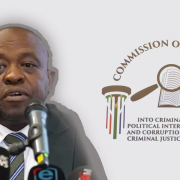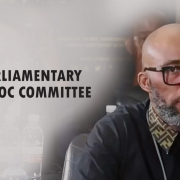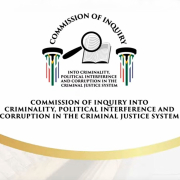|
Getting your Trinity Audio player ready...
|
What a week that was in the parallel probes into allegations of corruption in the criminal justice system!
From the explosive testimony of former police minister Bheki Cele before the parliamentary ad hoc committee looking into the allegations brought to light by KwaZulu-Natal provincial commissioner Lieutenant-General Nhlanhla Mkhwanazi in July, to the accounts of three in-camera witnesses before the Madlanga commission, also probing the same.
The Madlanga witnesses – named witnesses A, B and C – are all police officials who have over the course of 2024 and this year investigated matters relating to alleged organised crime syndicates and their ties to the top brass of the country’s police service as well as politicians. The commission heard their testimony in-camera for security reasons, as they have experienced threatening incidents over the course of their investigations. They were even placed on the witness protection programme following a threat risk assessment by the South African Police Service (SAPS).
Murder and intimidation
Witness A told the commission that the genesis of their troubles was their investigation into the murder that occurred on 17 April 2024 of engineer Armand Swart in Vereeniging in the south of Johannesburg. Swart was shot 23 times, ambushed as he arrived at his work premises that morning. The commission would also hear that his murder was a case of mistaken identity as he was thought to be a whistle-blower in a case involving an alleged bogus supplier to Transnet that would later be linked to the suspected hit organiser, controversial businessman Katiso Molefe and his nephew, Lucky Molefe. The latter worked for Transnet and was responsible for procuring the goods in question. He has been on the run since April 2024.
The detective team managed to almost immediately arrest the shooters by intercepting a vehicle carrying the suspects in Bramley in the north east of the city. Upon investigating further, it was determined through mobile phone records that the shooters may have been hired by Molefe, who too was later be arrested. Those charged in the Swart murder include former police detective Michael Pule Tau and alleged hitmen Musa Kekana and Tiego Floyd Mabusela.
Soon after the initial arrests, the threats and intimidation of the officers began, some from police officials believed by witnesses to be colleagues of Tau, along with interference by senior SAPS colleagues in the investigation process. Molefe and Tau, particularly, appeared to the detectives to enjoy so much protection from top police officials that a lot of crucial steps of the investigation were interfered with. On one occasion, Witness A was told by a colleague that they had arrested “umuntu wamageneral”, which means a person [close to or of] the generals.
The witnesses all told the commission that had it not been for the intervention of a number of members of the political killings task team (PKTT) – a unit with a specialised investigative focus that is at the centre of the current probes into police corruption – they would not have been able to make the discoveries that they have, which have helped their cases significantly.
The PKTT was formed in 2018 after a spate of killings of councillors in KwaZulu-Natal to focus on investigating such cases. It has since morphed into a multi-sectoral team of police officials, prosecutors, and correctional services officials. At its core, however, are the intensified methods of investigating high profile murders and other organised crimes.
Suspended police minister Senzo Mchunu attempted to disband it in December, a move that has cast his integrity into the spotlight.
Claims of judicial bias
Molefe, who was arrested on 6 December 2024, was eventually granted bail of R400 000 on 14 October, following his appeal of the dismissal of his bail request before the Alexandra Magistrate’s Court in August.
The second hearing, at the Gauteng High Court in Johannesburg, was extensively traversed by the commission. According to the witnesses, the handling of the bail hearing was biased and did not demonstrate neutrality.
The merits of the state’s case against Molefe were hardly considered, said Witness B. The arguments over his influence in the police and the potential intimidation of witnesses were not regarded. Witness A and B further testified that they were told by sources close to the case prior to the bail hearing that Molefe would be granted bail as he had paid an amount of R2.5-million for this to happen. Acting Gauteng Judge President Aubrey Ledwaba has since publicly denied the bribe claim, stating to the media that he wants an opportunity to appear before the commission to clear his name.
Part of Witness C’s testimony covers the December 2024 raid on the home of Vusimuzi “Cat” Matlala, who was arrested in May on an unrelated charge of attempted murder. The raid was due to a suspicion that Matlala was responsible for the kidnapping of missing businessman Jerry Boshoga. Searching Matlala’s mobile phones following the arrest, the team came across text messages between him and Brown Mogotsi, a figure who has emerged as an alleged “fixer”, that reveal a possible irregular relationship between him and senior SAPS officials, including deputy national commissioner Lieutenant-General Shadrack Sibiya, and others in which Mogotsi makes mention of Mchunu and his chief of staff Cedrick Nkabinde. Sibiya was suspended by national commissioner Fanie Masemola in July, following a press conference by Mkhwanazi that revealed an alleged attempt to divert attention to irregularities uncovered by members of the PKTT in the Molefe and Matlala matters.
Witness C is expected to return to the commission later this week to complete his evidence, while the parallel process that is the parliamentary ad hoc committee heard from both Mchunu and his predecessor, former police minister Bheki Cele, last week.
While Mchunu was largely grilled over his decision to disband the PKTT – a move that Mkhwanazi claimed was to disempower its members who had made the above-mentioned discoveries – Cele was taken more through policy and culture themes relating to the SAPS. He threw Mchunu under the bus over the PKTT, saying its origins were characterised by the formation of an inter-ministerial committee of the justice cluster to oversee its work and progress, so his unilateral decision to disband it, and the timing thereof – the end of December last year – was not proper.
Cele went on to talk about the direction taken in some high profile cases that have been in the public domain over the past few years.





